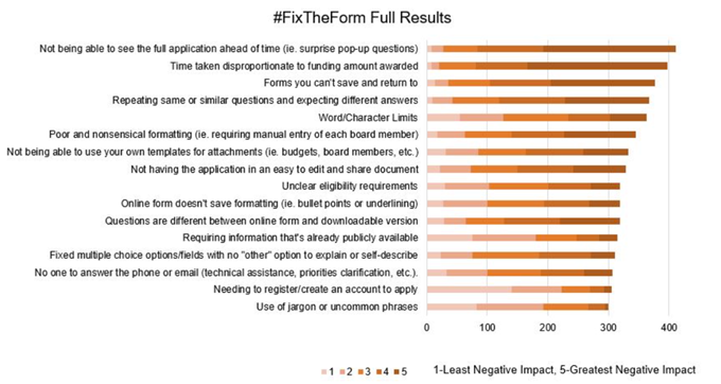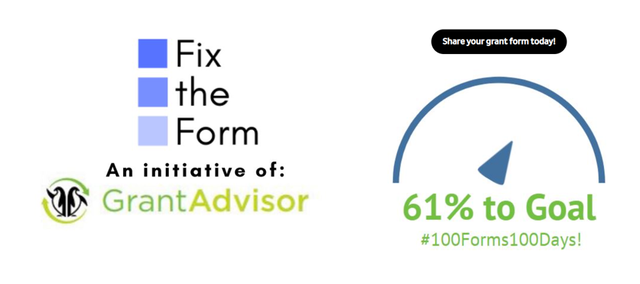|
With great power comes great responsibility. (Who actually said that first? A quick journey down an internet rabbit hole suggests it could have originated from Voltaire, Spiderman, The Sword of Damocles or the French National Convention, which isn’t hugely helpful...) Either way, I think it’s a phrase that applies very well to trusts and foundations. When you give away grants, you of course aim to have positive social impact. However, you can also inadvertently cost good causes money, in the form of convoluted application forms, poorly-planned processes and unclear guidelines. These things waste the time of charity leaders, paid fundraisers and volunteers – and this has a huge opportunity cost at a time when we’re more overstretched than ever. Funders mustn’t be exempt from criticism for this, just because they give money away. Let’s not forget that philanthropists also get many benefits: tax breaks, public recognition (if they want it) and the ability to influence how we make the world a better place. I’ve previously written about why we need to change the way we view philanthropy, and the things that funders can do better to ensure they a net positive financial impact on the sector. But I want to forget about the financial cost of bad application processes for a moment, and focus on another aspect – the human cost. Here are a couple of examples from my recent work.  Back in the 4th Century BC, Damocles first shared his views on the responsibilities of funders and philanthropists. Possibly. Credit: Richard Westall - own photograph of painting, Ackland Museum, Chapel Hill, North Carolina, United States of America, Public Domain, https://commons.wikimedia.org/w/index.php?curid=3437614 Example 1: The careless application deadlineRecently we were helping a client apply to the Postcode Local Trust. They open for applications on the first Monday of every month, but close as soon as they’ve received a certain ‘limited number of applications’ (a number they don’t actually publish). Will they stop accepting applications one week, one day or one hour after opening? Who knows, but imagine the frustration if you spend time working on an application that you’re then unable to submit. This is already questionable practice, but in May 2021 their application date coincided with the Early May Bank Holiday. We phoned them to check they were aware of this – they said that yes they were, and there was a good chance they’d close after reaching that maximum number of applications on that same day. One of our client’s staff team duly made a note to interrupt her day off – and day out with her family – to switch on her laptop, copy/paste the pre-prepared answers into the application form, and submit it before an unspecified number of other applicants (presumably sacrificing their own Bank Holidays) beat us to it. This might not be the biggest issue ever, but for me it’s the sheer pointlessness of it all. At a time when so many fundraisers are feeling under pressure and burnt out, why make things worse by coinciding your application deadline with a Bank Holiday? I can’t see how it brings any benefits for the funder – and a tiny change would’ve made a big difference for applicants. Becoming a Dad last year has given me a different perspective on these things. When you work long hours, your evenings, weekends and days off are a precious commodity. A carelessly-timed application deadline (or indeed, any form of unnecessary bureaucracy) no longer prevents me from doing things like having a lazy morning or going out for a drink – it stops me spending time with my family. Example 2: The unannounced grillingLast Autumn, I worked with a client to submit a ~£10,000 application to a local Bristol funder. After six months we still hadn’t heard anything, so assumed it had been unsuccessful. Then, out of the blue, the charity’s Director got a call from their administrator who launched into a series of on-the-spot questions about their accounts. As a small charity in a tight financial spot, this was a stressful experience – answering quickfire questions about an application they could barely remember, worrying that one slip-up might cost them a much-needed grant. Happily, the charity did eventually get the grant, but this still left a bitter taste in my mouth. Asking detailed financial questions is understandable, but why not put them in an email, or agree a time to speak in advance, to give applicants some time to dig out the application and the required detail? Most importantly, this risks skewing the application process. Answering detailed questions on the phone without warning will be harder for applicants whose first language isn’t English, smaller organisations with less financial expertise, and people who work part-time. There’s a risk that funding will be awarded based on which organisations answer on-the-spot questions better, rather than those who have the best projects or most social impact. Having accessible and reasonable application processes matters – so step forward #FixTheFormThese are just two examples of questionable funder practice, neither of which had much long-term negative impact. But magnify this across the whole sector – thousands of funders and millions of applications – and it’s a different picture. Badly designed application forms and inconsiderate processes waste time and money, create unnecessary barriers, cause anxiety, and divert people’s time away from much more important things – and frustratingly, it could easily be very different. One movement trying to change all this is #FixTheForm, an initiative of Grant Advisor. In November 2020, they surveyed 500 grantseekers in nine countries to catalogue their frustrations and pain points. This showed the same issues popping up time and again, with applicants losing hundreds of hours to badly designed forms and processes. According to respondents, the biggest issue was funders not showing their full application form at the start of the process: Perhaps these issues shouldn’t be surprising. While some funders might not be interested in making improvements to benefit applicants, many simply lack the time and resources. Maybe they don’t even understand the problems they’re causing – understandably, while many applicants would probably love to share feedback, they don’t feel that doing so while asking for money is a very wise idea. This is why #FixTheForm’s survey – and what they’re doing in response – is so important. Their new 100 Forms in 100 Days campaign aims to persuade 100 funders to join their growing list of ‘ReFormers’ by making a fully transparent application form publicly available on their website. With just over a month to go, they’re almost two-thirds of the way there. If you’re a charity or social enterprise, you can support #FixTheForm by sharing the 100 Forms campaign with your own funders, talking about it on Twitter, or looking out for future opportunities to share your application experiences with #FixTheForm. And Laura Solomons, who’s leading the #FixTheForm charge in the UK, is a great person to follow on Twitter if you ever want to discuss or draw attention to questionable funder practice. Neither of my recent experiences above would’ve been solved by a downloadable application form – but based on the #FixTheForm survey results, it’s a really important starting point.
Being a recipient of grant funding doesn’t mean you should simply be grateful and turn a blind eye to processes that make your life harder. Agitating for change is in everyone’s best interests – and if a funder is truly motivated to maximise their social impact, making these changes will be important for them too.
0 Comments
|
Like this blog? If so then please...
Categories
All
Archive
May 2024
|
Lime Green Consulting is the trading name of Lime Green Consulting & Training Ltd (registered company number 12056332)



 RSS Feed
RSS Feed